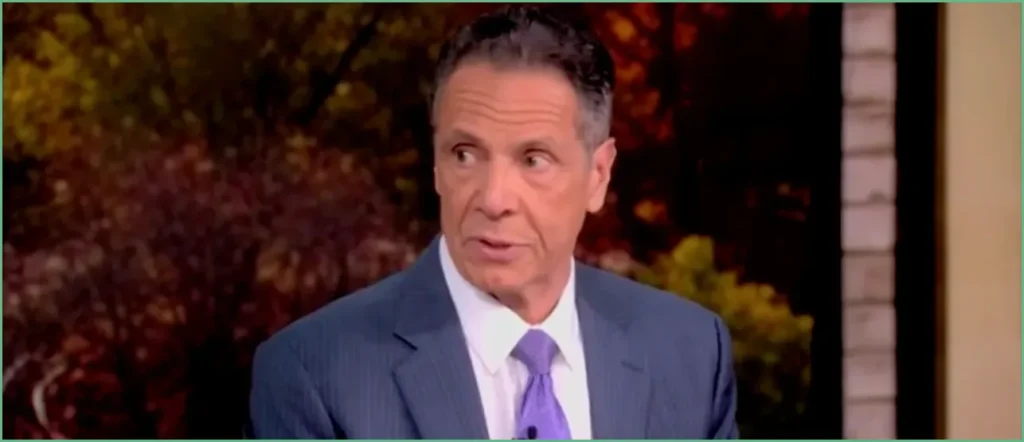Cuomo Says He’s ‘Learned A Lesson,’ Won’t Go In For A Kiss Unless Invited
Andrew Cuomo is back in the headlines claiming he’s changed his ways and learned a lesson, but tone and timing matter in politics. The former governor, now running for New York City mayor as an independent, is offering apologies and explanations while facing the shadow of multiple investigations. Republican voters will read those words through the frame of accountability and consequences.
Cuomo told ABC’s panel he won’t kiss anyone on the cheek unless they initiate it, presenting that as a new personal rule born of painful experience. The line reads like damage control, a neat soundbite meant to close the loop on a saga that still haunts public opinion. For many, a rule about cheek kisses won’t neutralize years of allegations and reports that accused him of far worse behavior than awkward gestures.
The legal and political record is messy: Cuomo resigned from the governorship in 2021 after a state assembly report concluded he sexually harassed state employees. Prosecutors and independent investigators documented patterns that the public found disturbing, and those findings are hard to erase with a line about being “more cautious.” Republicans will say consequences should follow findings, not just PR shifts.
Cuomo insists he was politically targeted and points to dropped charges in court as vindication. A judge dismissed certain criminal charges and Albany County prosecutors declined to proceed, which Cuomo highlights as proof that the judicial system did not sustain criminal liability. Still, federal investigators later produced their own report that landed new and damaging conclusions, complicating any simple claim of exoneration.
“When the report was issued, I said I believed it was politically motivated, and it was. I didn’t even know the allegations at that time, right? It was done in a report. I didn’t even know who the individuals were. We then spent five years, that report went to five district attorneys all over the state. No one found anything,” Cuomo said.
That quote will be repeated by his defenders as proof of overreach and political warfare. Republicans, and many independents, will point to a larger pattern: political elites rallying for optics and narrative control while ordinary voters get explanations without real closure. The difference between legal guilt and political responsibility is central here; voters decide whether a candidate can credibly seek high office after such headlines.
What He Said and What It Means
Cuomo doubled down on the emotional toll, saying the episode was painful for him and his family and insisting he “didn’t mean it” if anyone was offended. That phrasing aims to humanize and soften a figure who once towered over New York politics, but it reads like the language of someone trying to close the file. Republicans will say empathy is not a substitute for responsibility.
He framed the legal journey as long and fruitless, noting that civil suits and other actions “came to nothing” and that he was “dropped from the cases.” That chronology is technically true in part, and it is one of the reasons he argues he should be able to resume public life. Yet being dropped from cases is not the same as a full clearing of the political or moral docket, especially after an independent investigation and a DOJ review found troubling patterns.
“I did say if I offended anyone in any way, I didn’t mean it. I learned a lesson, a painful lesson, which is to be much more cautious about everything you say, any joke, any comment,” Cuomo said. “I won’t kiss a person on the cheek unless they initiate a kiss. So it taught me a lesson, just to be super cautious because there is a sensitivity that has evolved that is real. If people feel it, it’s true. And it has to be respected.”
That passage includes an acknowledgment that public standards and sensitivities have changed, and he invites the audience to accept his adjustment. Republicans will stress that acknowledgment should be paired with a full accounting and credible steps to rebuild trust if a candidate expects to govern. Voters who care about character and judgment will weigh words against documented findings.
The Department of Justice report later found that Cuomo sexually harassed 13 women and tolerated a hostile workplace, adding fuel to the argument that this was larger than simple misunderstandings. For those of us watching from a conservative viewpoint, the takeaway is about standards and the durability of leadership reputations. A headline apology does not erase institutional failure or shield a candidate from scrutiny at the ballot box.
Cuomo’s message of caution and changed habits may resonate with some voters who favor redemption narratives, but many conservatives and independents will insist on clearer accountability. Running for mayor after such high-profile controversy is a bold move, and bold moves are judged by results and credibility, not by contrition alone. The coming campaign will test whether a lesson is enough to restore public trust.
Whatever your politics, the episode is a reminder that leaders face lasting consequences for behavior that undermines workplace safety and respect. Republicans will keep pushing for tough standards and for voters to judge officials by their record and conduct, not just their spin. In politics, a lesson claimed privately must be proven publicly.
